TV: 'The Gilded Age' Premiere Gives Us Actresses Galore
 Tuesday, January 25, 2022 at 6:00PM
Tuesday, January 25, 2022 at 6:00PM 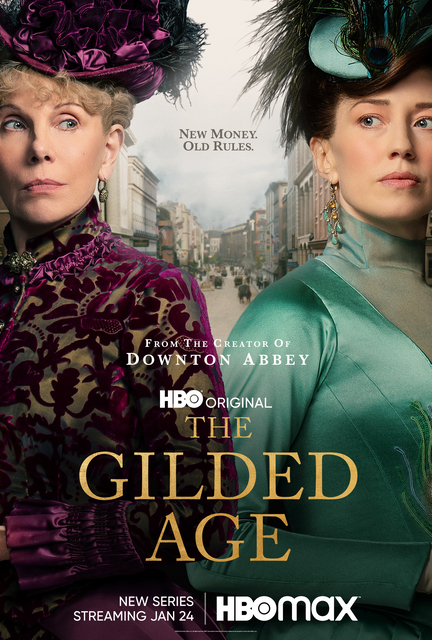 Which side do you choose in this actress battle royale - Baranski or Coon?
Which side do you choose in this actress battle royale - Baranski or Coon?
The Gilded Age has so much going for it. Christine Baranski and Cynthia Nixon are old money sisters engaging in war with their new-money neighbor, played by Carrie Coon. Created by Downton Abbey and Gosford Park scribe Julian Fellowes, HBO’s latest series promises opulence, conflicts around societal manners, corsets, and actresses galore.
No surprise, then, that there has been considerable interest from the rest of the Film Experience team on The Gilded Age, so we’ll be doing weekly coverage of each episode. Five episodes have been screened for critics, so for today quick overall thoughts, followed by a review of the pilot. Make sure to check back each Monday as we recap the latest episode of the nine-episode first season.
Does The Gilded Age live up to its pedigree?
EPISODE ONE - "NEVER THE NEW"
The tagline for The Gilded Age promises a lot: Money, Wealth, Ambition. It sure delivers on a lot in its hour and twenty minute premiere. This 1882 version of the Upper West Side by way of Wisteria Lane comes visually alive under director Michael Engler’s vision. Fifth Avenue becomes the battle lines for the elite, as the new money Russell Family (Carrie Coon, Morgan Spector, Harry Richardson, Taissa Farmiga) moves across the street from the old money sisters Agnes van Rhijn (Christine Baranski), a grand dame widow, and Ada Brook (Cynthia Nixon), a jolly spinster.
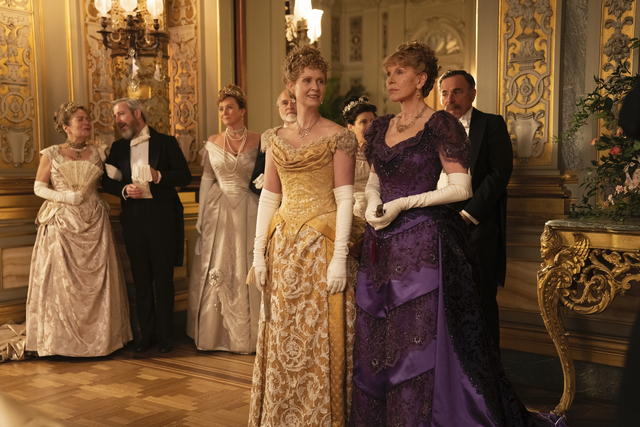 The party doesn't start until Christine Baranski and Cynthia Nixon walk in.
The party doesn't start until Christine Baranski and Cynthia Nixon walk in.
Our story doesn’t begin here quite yet, though. We first travel to rural Pennsylvania, where Marian Brook (Laura Jacobson) learns upon the death of her Father, Henry, that she has only $30 to her name. With nowhere else to turn, she reaches out to live with her Aunts Agnes and Ada in New York, whom her Father had always hated.
Just as Fifth Avenue is about to gain a new tenet with Marion, the Russell family seems determined to make an entrance as they move into their palace three years in the making. “Big enough to be splendid without being oppressive,” boasts George (Spector) mockingly. “I agree, we need to breathe” coos Bertha (Coon) as a chandelier the size of my apartment is hoisted above her. Even the Phantom would struggle with whether to marvel or roll his eyes. Across the street, Agnes knows what her reaction is - utter disdain. While Ada seems optimistic about their new neighbors, Agnes clutches her old money roots tight. She fears that the wealth and ambition of the Russell’s will dethrone those who have held power in New York society for generations. Her fears are correct. Both of the Russell’s have grand plans for their new lives further up in Manhattan. Bertha seeks to conquer New York society, while George looks to accumulate even more wealth through opening another major railroad station in New York by any means necessary.
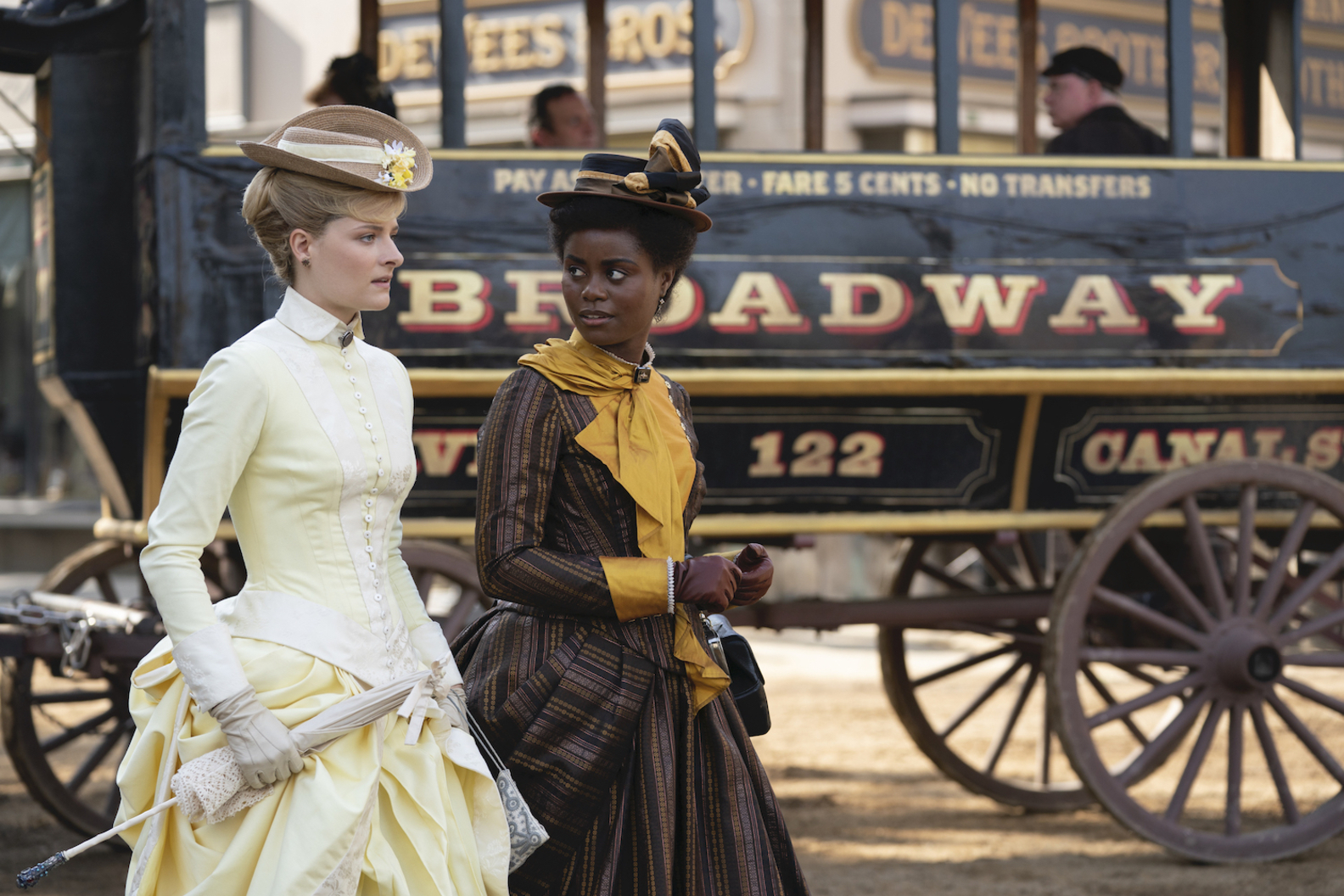 Marian (Louisa Jacobsen) and Peggy (Denée Benton) are new arrivals to New York City, circa 1882.As Marian makes it out of Pennsylvania, she engages in classic, outsider protagonist behavior and loses her purse containing her ticket and last $30. In steps Peggy Scott (Denée Benton), a black woman who takes pity on Marian and pays for another ticket for her. “I’m sorry it’s not first class,” Peggy replies as Marian loudly coughs out the window while riding in the segregated car. Peggy’s act of kindness is repaid quickly as Marian brings Peggy with her to her aunts so she can stay the night in the servant’s quarters. Even in 2022, it’s strange that we’re asked to stomach this shallow of an introduction. Peggy has to be the kind, sole person-of-color who gets “rewarded” by sleeping in the downstairs portion of this “upstairs downstairs” tale. There’s being historically accurate and then there’s trading in stereotypes. We learn here of Peggy’s interest in writing, finally giving the character some agency and direction in a show that tries too clumsily to layer on race in its study of old money versus new money.
Marian (Louisa Jacobsen) and Peggy (Denée Benton) are new arrivals to New York City, circa 1882.As Marian makes it out of Pennsylvania, she engages in classic, outsider protagonist behavior and loses her purse containing her ticket and last $30. In steps Peggy Scott (Denée Benton), a black woman who takes pity on Marian and pays for another ticket for her. “I’m sorry it’s not first class,” Peggy replies as Marian loudly coughs out the window while riding in the segregated car. Peggy’s act of kindness is repaid quickly as Marian brings Peggy with her to her aunts so she can stay the night in the servant’s quarters. Even in 2022, it’s strange that we’re asked to stomach this shallow of an introduction. Peggy has to be the kind, sole person-of-color who gets “rewarded” by sleeping in the downstairs portion of this “upstairs downstairs” tale. There’s being historically accurate and then there’s trading in stereotypes. We learn here of Peggy’s interest in writing, finally giving the character some agency and direction in a show that tries too clumsily to layer on race in its study of old money versus new money.
Right away, Agnes lays out the rules to Marian. “We only welcome the old in here, not the new,” decrees Agnes with the delicious authoritarian tone that only Christine Baranski can deliver. The first test of this comes at a charity gathering, which is comically devoted to “training orphans to become servants.” Hosted by the Morris family, both sides of Fifth Avenue have their motives for attending. The Russells look to sway Mr. Morris, the city alderman, to approve of their new train station. Meanwhile, Agnes and Ada feel this is the perfect setting to introduce Marian to the world.
Like any great party (sorry, ahem, charity gathering), we are immediately greeted by Kelli O’Hara as Aurora Fane, a socialite clad in what can only be described as the 1880s version of Meredith Marks feathers. Before one can catch their breath, another Broadway legend, Katie Finneran, pops up as Anne Morris, the host. After brief barbs are exchanged between them and Bertha, they immediately point out the black sheep in the room, Sylvia Chamberlain (Jeanne Tripplehorn). No matter who you ask, all cower when her name is mentioned, as if someone said Macbeth in a theater. “If you see her, turn your nose at her and look away,” advises Agnes.
Invigorated from her first event in New York society, Bertha decides to host a viewing of her home, aka a housewarming party. Her invites send shockwaves up and down Fifth Avenue. Will curiosity get the better of the stuffy old money people?
Not all members of the two families hate each other. At a posh croquet party, recent Harvard graduate and golden boy Larry Russell (Harry Richardson) runs into the gallivanting Oscar van Rhijn (Blake Ritson), who is not eager to tell his mother he has returned from Europe. Still, return they must to the isle of Manhattan. Almost immediately, Larry and Marian have a meet cute as he saves her dog from being run over by a carriage. Meanwhile, Oscar appears to be surprised and delighted to discover his cousin is not “a dowdy spinster at all” once he finally makes his way to mother Agnes.
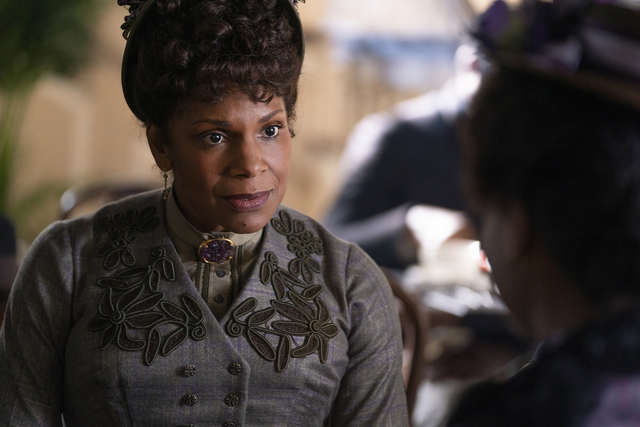 Yes, that's right, Audra McDonald is in this too!
Yes, that's right, Audra McDonald is in this too!
Peggy’s contact with home is much less warm than Larry and Oscar’s return. She meets her mother, Dorothy (Audra McDonald, pause for screams), in a crowded restaurant, informing her that she is not returning home. The issue at hand - Peggy dreams of being a writer, despite her Father’s disdain and wishes. Dorothy can’t fathom Peggy making a living as a writer, but delivers her some clothes and wishes her well, leaving the door open for her to come home anytime she pleases.
We’re already an hour into the episode and there are still more burning questions that need answering. So why does Agnes hate Marian’s Father so much? It turns out Henry had sold the Brook family farm and house, spending all the money and giving none to his sisters. Agnes was forced to marry in order to stay afloat, and she ended up with a rich, yet abusive man.
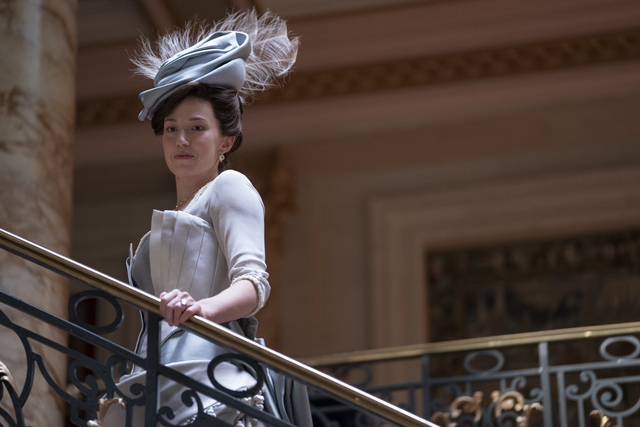 Why spend three years building a house if you aren't going to show it off?
Why spend three years building a house if you aren't going to show it off?
Bertha’s housewarming isn’t quite the party she had hoped for. Yes, Marian attends, fading in with the furniture for a few brief moments to start a friendship with Larry and get a stare from Bertha. Still, Carrie Coon’s scorn is mostly reserved for Aurora Fane, who stops in without her husband or her friend, Anne Morris. Bertha doesn’t want to be the town oddity, she wants to be the Queen Bee.
We end on one of the most obvious reveals possible, Oscar is gay! It’s hard to say what tipped us off. The mustache definitely felt very queer. Being Christine Baranski’s son didn’t help. Still, the gayness only increases in the last few minutes. Mrs. Astor, the pinnacle of high society is revealed to be played by none other than Donna Murphy. Intercut with a crying Bertha screaming that she will not lose, Mrs. Astor caustically throws Bertha’s invite in the fire.
In the span of 80 minutes, we’re introduced to a host of storylines, get a bevy of Broadway cameos and watch many grand actresses scowl while looking through a window. There are some strong seeds here for an entertaining first season. However, it doesn’t feel like the plot has fully been set into motion. Episode Grade: B-
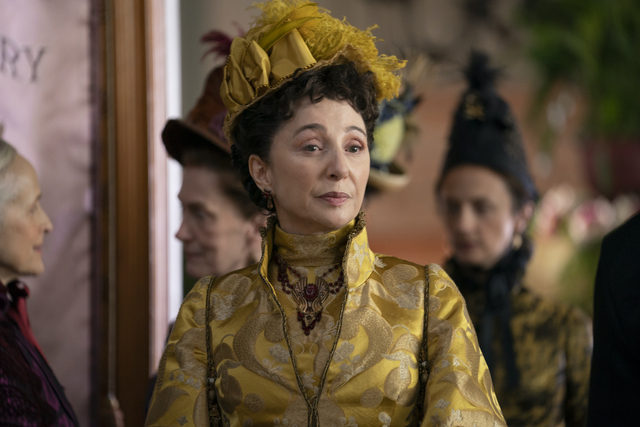 Don't you worry, we haven't seen the last of Donna Murphy as Mrs. Astor.
Don't you worry, we haven't seen the last of Donna Murphy as Mrs. Astor.
OVERALL THOUGHTS ON THE FIRST FIVE EPISODES (No Spoilers)
It may be too big to fail, but the latest HBO show does underwhelm. There’s plenty to marvel and react to in the first five episodes provided to critics. The sets are grand, the costumes are marvelous and every word out of Christine Baranski’s mouth drips with venom. So why do the minutes pass by so slowly?
Strangely enough, it’s the writing that appears to be the Achilles heel of HBO’s latest prestige show. Julian Fellowes scripts are loaded with detail and fabulous bon mots. However, what is it all for? Carrie Coon’s Bertha desperately wants power, while Christine Baranski’s Agnes won’t let one bit of inherited influence slip from her cold grip. Two titans face off in a battle of glares, put downs and interior design. Yet, the show never goes deeper on this desire for more. It always feels like these women want more for more’s sake. That’s not necessarily a bad place for a show to start out. Unfortunately, Fellowes never seems to make much of a comment on these women’s greed. If anything, the show roots for Bertha to take down the societal institutions of Fifth Avenue, as if one rich woman upending another rich woman stands for actual progress.
At the very least, the actors give audiences plenty to be entertained by. Coon commits fully to Bertha’s pathological quest for respect, delighting in every move she makes. Across the street, Baranski and Nixon make for a hilariously mismatched pair, as if they were the Pinky and the Brain of Fifth Avenue.
Once we stray from the legends, the bloat of the show becomes unmistakable. Jacobsen feels lost as Marian, our entryway into this world of high society drama. Perhaps it is because Marian’s drive feels so ill defined. She wants to make her own way in life, but never quite defines what direction it is she wants to head. Still, one can’t help but mistake her for looking like the third most talented Streep daughter. Very little pulls us to her character, when she’s supposed to be the lens pulling us into this world.
In fact, for all the trepidation in the first episode, the best subplot ends up belonging to Peggy. Her goal to be a writer leads us on this Little Women-esque journey through the literary magazines of the time. Compounded by the adversarial relationship with her more practical Father, Peggy has the most dramatic heft of any person in The Gilded Age to date. The show wisely builds out her world more outside of the servants quarters as the show goes on.
All in all, the show lacks sauce. The bitchy comebacks could be bitch-ier. It’s dramatic punches could be louder. There never seems to be much of a sexual pulse at all, perhaps since the project originally was developed for broadcast TV with NBC. “It’s not TV, it’s HBO” the network once bragged. The Gilded Age may look rich, but is it worth the HBO premium? So far, it’s more like HBO-Lite. Grade So Far: C+
What did you think of The Gilded Age premiere?



Reader Comments (11)
I'm not sure about seeing this though I'm sure Cynthia Nixon is much better in this than the bullshit that is And Just Like That... as I've been reading on what Miranda does and I hate it. I really fucking hate it.
Gawd, it's so meh despite the pedigree of the cast. And maybe that's the problem? They are so well known and so well regarded that it's hard to separate THEM from their characters, characters which I care so little about at this point. And no decent male characters so it seems like an 1880s version of Real Housewives of [insert city]; bitchy rich women with nothing to do but bitch. It's also a period in American history I care little about; a small group of rich people who got richer on the backs of the poor, who just got poorer.
Hope there's gonna be a musical episode with all that magnificent Broadway talent. I'll keep watching, but only as filler while I'm on the treadmill, just like I do with Sanditon or All Creatures Great and Small. Meanwhile, I'll be over here waiting for the next season of Bridgerton to air in February. At least we'll get some va-va-voom and eye candy. Though, to be fair, Carrie Coon's hats are FANTASTIC, so there is some "costume" eye candy in The Gilded Age.
@thevoid99 I really don't get the hate for AND JUST LIKE THAT. It's just above mediocre, but so was SEX IN THE CITY. Still, streaming one episode every week or so when it's too late to put on a film (or even summon up the energy for a full hour of some drama--like THE GILDED AGE), always works for me at the end of a long day. It just seems like it's fashionable distain: like all the people who loved disco in the 70s suddenly screaming about how terrible it was in the 80s.
The Gilded Age's first episode was exactly what I expected it to be, and I'm so here for it. More Audra, more Donna please.
I never watched Downton Abbey (despite friends and family urging me to do so for years) because it seemed silly, like soap opera dressed up in costume and accents in order to seem "classy" and acceptable. This show confirmed I was correct - the writing is so shallow. That said, I love the actresses and the era enough to overlook how dopey this seems at times (I guess it's becoming socially unacceptable to say you love the era now, but it did produce some of the best American novels ever written). So I'll keep watching.
jules -- except this show is NOT downton abbey so it's unfair to draw that conclusion. I was disappointed in this first episode and though it does have some similarities i wish it was as focused on Downton Abbey (which at least as pilots go was much much much stronger writing). Abbey spent a lot of time on the socioeconomic divide of the upstairs/downstairs effect and all took place in basically one house. It was focused. This one has so many households and it's basically rich people vs rich people thus far with what looks to be about twice as many (at least) characters as Downton Abbey.
Christopher -- my biggest problem with this other than the total chaos of having 3 dozen characters was that every single person has such a beautiful singing voice that i was like "why cant this be a musical???" Seeing Michael Cerveris and Audra McDonald and Kelli O'Hara and Donna Murphy in short succession (and that's just the most famous of the Broadway musical stars*) had me aching for huge songs.
*I consider Christine Baranski more of a TV star which is why i didnt name check her)
Everyone - Claybourne Elder who plays the gay son of Donna Murphy is currently on Broadway in COMPANY as the dumb hunky flight attendant and he's quite good in that!
With every new Julian Fellowes project, I've come to appreciate Robert Altman more and more.
This is an odd show. I enjoyed the first episode, but I didn't love it. And I should have. I went back and watched the Downton pilot, and I think something that show had which this one doesn't (yet), is that it was a far simpler story (one house, rather than two) and we instantly cared about the relationships between the characters. I also think the characters are revealed in really direct, but enjoyable scenes (e.g., Mary's self-centeredness, Edith and Mary's disdain for each other, Violet being a manipulator who doesn't love Cora, etc.).
With Gilded, we only got to see that in a few places. I think the reason why Baranski, Benton, Coon, and Spector work well is because they're well defined characters AND there's an interesting dynamic between them and others. The Peggy/Agnes alliance is interesting, and Benton is giving a really great performance. Coon dove into the materiel and was almost grating, but it really does give you the sense that she is new money and that she expects her money to matter. Similarly, Spector and Coon have a fascinating dynamic, you get the sense that they support each other's ambitions, even if Spector thinks all of the society stuff is sill.
The biggest miss is all of the Marian stuff. The actress is really wooden and it also feels like she, nor the writers, have a grasp on her character. Fellowes doesn't do well with character searching for motives and meaning. Especially if they're not fun. Ada also seems way too well defined, and fairly uninteresting. I could see her developing into a character we care about, but I'm not certain of that yet.
All the downstairs characters feel ill-defined and almost unnecessary given the story they seem to be setting up.
The gay son affair and Astor reveals were a lot of fun.
Having only seen the pilot, I'm also underwhelmed. So far most of the characters are uninteresting, especially Louisa Jacobson's Marian. She's no Lady Mary or even a Lady Edith. The fun so far is in seeing all these great theater actors, but if they're not given anything to do it would be a waste of talent.
And, this is small, but some of the digital shots just look bad. I get that this is what film looks like now, but it's quite distracting.
I liked Baranski and the hats. Expected more.